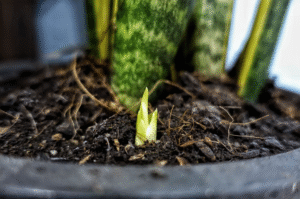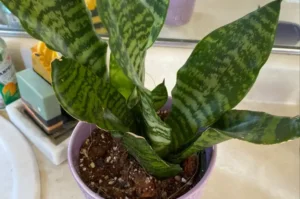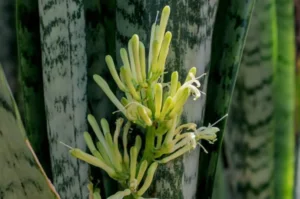Snake plants (also known as Sansevieria or Dracaena trifasciata) are among the most resilient and beginner-friendly houseplants. Their stiff, upright leaves and tolerance for neglect make them a top choice for indoor gardeners. But what happens when one of those strong leaves breaks? Can you still grow a new snake plant from that broken piece?
The answer is yes! Snake plants can be propagated from a broken leaf. This method is one of the easiest and most rewarding ways to grow a new plant. In this guide, we’ll walk you through everything you need to know about growing a snake plant from a broken leaf.
Why Snake Plants Are Easy to Propagate
Snake plants are naturally adapted to survive in tough conditions. One of their most interesting traits is their ability to regenerate from a single leaf. This means even a broken or damaged leaf has the potential to become a new plant, as long as it is healthy and handled correctly.
Here’s why snake plant propagation works so well:
- Their leaves can store water and nutrients.
- They can grow roots without a root system.
- They tolerate minor mistakes during propagation.
Can a Broken Snake Plant Leaf Grow Roots?
Yes, a broken snake plant leaf can grow roots if it’s placed in the right conditions. When you propagate from a leaf cutting, the plant redirects energy to develop roots at the base of the cut. Over time, small rhizomes (underground stems) may also form, producing new leaves and eventually growing into a full plant.
However, not every broken leaf is ideal for propagation. Avoid using:
- Leaves that are rotting or mushy.
- Leaves with signs of pests or disease.
- Severely dried-out leaves.
Choose firm, healthy leaves, even if broken, as your best chance for successful propagation.
How to Grow a Snake Plant from a Broken Leaf
You can propagate a broken leaf using two main methods: in water or directly in soil. Below are the steps for each.
Method 1: Water Propagation
Water propagation allows you to see root growth before planting the cutting in soil.
Steps:
- Trim the Leaf
Cut the broken leaf cleanly using sterilized scissors or a knife. Make a straight horizontal cut across the bottom. - Let it Callous
Leave the leaf in a dry place for 1–2 days so the cut end can callous. This prevents rot when placed in water. - Place in Water
Place the calloused end in a glass or jar of water. Only the bottom inch should be submerged. - Choose a Bright Spot
Keep the jar in indirect sunlight. Change the water every 4–5 days to keep it fresh and prevent bacterial growth. - Wait for Roots
In about 3–6 weeks, roots will start to grow. Once they are an inch or longer, you can move the leaf to soil.
Method 2: Soil Propagation
Soil propagation skips the water step and allows roots to form directly in potting mix.
Steps:
- Prepare the Cutting
Cut the broken leaf cleanly and let it dry for 1–2 days. - Plant in Soil
Use a well-draining potting mix (cactus or succulent mix works well). Insert the leaf about 1–2 inches deep, cut-side down. - Water Lightly
Water the soil lightly. Avoid overwatering, as this can lead to rot. - Provide Indirect Light
Place the pot in a spot with indirect sunlight. - Be Patient
It can take several weeks before roots form. Resist the urge to tug on the cut to check for roots.
Tips for Successful Propagation
- Label the Cutting: If you’re planting multiple cuttings, label the top and bottom so you don’t accidentally plant it upside-down.
- Use Rooting Hormone (Optional): Dipping the cut end in rooting hormone may help encourage faster root growth.
- Avoid Overwatering: Always let the soil dry out between waterings to prevent root rot.
- Use Clean Tools: Sterilize scissors or knives before cutting to avoid introducing bacteria or fungi.
How Long Does It Take to Grow a New Snake Plant?
Growing a snake plant from a broken leaf is not fast, but it is worth the wait. Here’s a general timeline:
- 2–4 weeks: Root development starts.
- 1–2 months: New rhizomes may form.
- 3+ months: Baby snake plant leaves start to emerge.
Remember, growth can be slower in colder months or if light conditions are poor.
Common Problems and How to Fix Them
| Problem | Cause | Solution |
| Leaf is rotting | Too much water | Let the cutting dry and reduce watering |
| No root growth | Low light or poor cutting | Move to brighter location, try a new leaf |
| Leaf wilts or droops | Planted upside-down | Ensure the base of the leaf is planted downward |
Frequently Asked Questions (FAQs)
Can I plant the whole broken leaf?
Yes, you can plant a full broken leaf, but it’s better to cut it into 2–3 inch sections and propagate each one individually. This gives you more chances of success.
Will the new plant look exactly like the original?
Not always. Some variegated snake plants may lose their patterns when grown from leaf cuttings. For true clones, division from the root is more reliable.
Can I use a leaf that snapped in half naturally?
Yes, as long as the part you’re using is still firm and healthy. Just be sure to cut the base cleanly before propagating.
Conclusion
Growing a snake plant from a broken leaf is not only possible but surprisingly simple. Whether you propagate in water or soil, a healthy leaf and a little patience can result in a beautiful new plant. It’s a great way to recycle damaged leaves and expand your indoor garden.
So next time a snake plant leaf breaks, don’t throw it away. Turn that break into an opportunity to grow something new!






